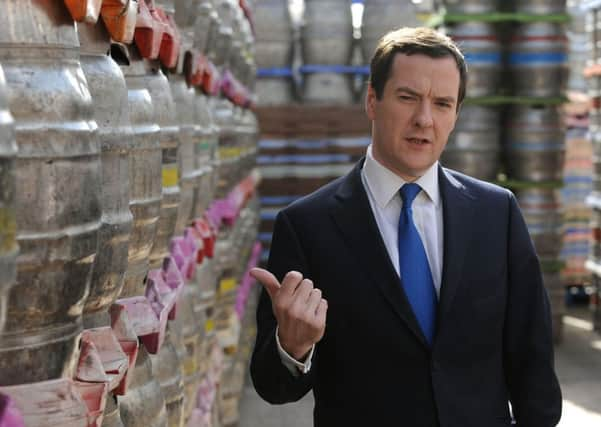Osborne accused of giving banks ‘secret tax cut’


In a year when UK investment bank bonuses have increased from £1.4 billion to £1.6bn, he has launched a consultation on his flagship bank levy, after it emerged it was not bringing in the revenue he had expected.
The move, which will bring in a council tax-style banding system, has been criticised by opposition parties as evidence the Tory-led coalition is “helping its wealthy friends in the City”.
Advertisement
Hide AdAdvertisement
Hide AdUnder the banding proposals, it is estimated HSBC and Barclays will pay £300 million less between them.
In 2012-13, Barclays paid £504m in levy charges and HSBC £544m, the most of any bank. Under the new proposals, Barclays’ total would have been £129m lower and HSBC’s £169m less. With the levy set to rise by 20 per cent this year, the combined savings of these two banks could be as much as £400m.
Labour’s shadow financial secretary to the Treasury, Cathy Jamieson, said: “This looks like a secret tax cut for the big banks hidden in George Osborne’s Budget.
“How can that be a priority at a time when working people are worse off and the banks can afford to pay out bigger bonuses?”
The Kilmarnock and Loudoun MP went on: “The bank levy has already raised billions less than was originally promised. George Osborne must come clean and explain what impact this banding will have on revenues from the bank levy in future years.
“Labour would increase the bank levy to raise an additional £800m a year. This would fund an expansion of free childcare places for working parents of three- and four-year-olds to 25 hours a week.”
The SNP said it was an example of how an independent Scotland’s tax system would be fairer.
Its Westminster Treasury spokesman, Stewart Hosie, said: “This looks like a gift from the Tories to their friends in the City.
Advertisement
Hide AdAdvertisement
Hide Ad“It’s not unusual for Budgets to contain unpleasant surprises, but this detail seems to be hidden away. George Osborne ought to make clear what impact this banding will have on future bank levies.”
But the Treasury insisted the measures would not reduce the total amount of tax raised from the banks and that they were aimed at encouraging banks to lend more to small businesses and take fewer risks.
Sources there said banks were currently encouraged to take risks rather than lend to businesses, and the proposed changes would reverse this.
The changes aimed to make sure the levy raised the amount expected and encouraged good banking practice.
A Treasury spokesman said: “The bank levy is forecast to raise £2.9bn a year from 2015-16, according to the independent Office of Budget Responsibility and the government has no plans to reduce the amount of money the levy raises.
“The consultation, announced at [the] Budget last week, will look at ways to make the levy more predictable and sustainable moving forward.
“The suggested changes will not impact on the target yield from the levy, which is designed to ensure that the sector makes a fair contribution.”
However, experts warned any tax cuts for the banks would have to be made up from reductions elsewhere.
Advertisement
Hide AdAdvertisement
Hide AdWayne Weaver, UK banking tax leader at consultancy firm Deloitte, said: “The issue with lowering the tax on some of the biggest banks is that the Treasury has to make up the difference somewhere else and that more than likely means raising the cost to international firms – some could see a big increase in their share of the cost.”
Tom Aston, head of banking tax at accountants KPMG, said the UK government was worried about its position on banks.
He said: “The government will not want to appear soft on taxing the banking industry, but if the latest proposals are intended to please the UK banks, then there is a significant burden to be redistributed on to foreign institutions.”